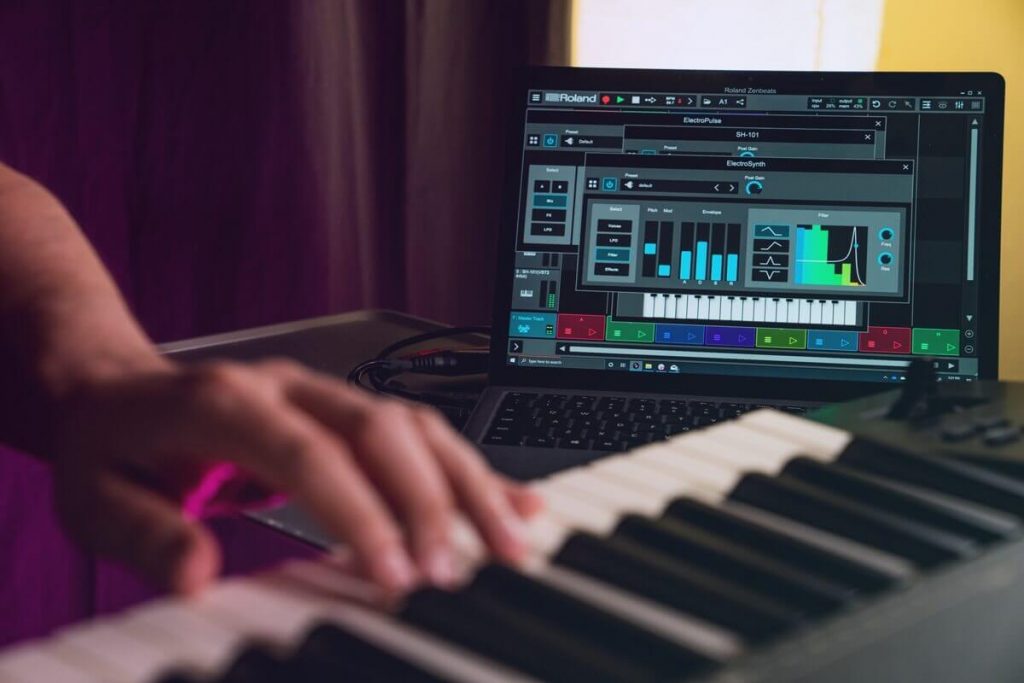How to Beat Writers Block? 24 Tips to Get the Creative Juices Flowing
How to Beat Mental Block & How to Be Creative
… are popular questions amongst us creatives, am I right? If you find yourself stuck between a rock and a hard place too often, we’re here to help you. There’s no shame here, only guidance. Here are our top tips to help you get your music back on track.
Be Proactive!
- Create a Routine & Keep Your Goals in Mind
To get anywhere with anything takes discipline, and discipline takes drive – not motivation. You get motivated to do singular activities, but you’re driven to be a certain way… a musician. Before you create a routine, you should sit down in a quiet place & write down what it is you really want. Not just from your music, but from your life. The next few tips will give you our ideas of what an effective schedule could look like for staying creative, but you will inevitably have priorities to fit into your week. The biggest tip we can give you in terms of scheduling is stick to a weekly planner and leave some slots open for plans to chance, because they will. - Listen as a Listener
Stop taking music so seriously for 15 to 30 minutes a day. If this is a lot, then settle for an hour a week. Create a space in your daily to weekly schedule, even if it’s on your way home from work or when you go out for a walk (tip 4) to just be a fan rather than a creator.
Active listening is a task but passive listening is a hobby, and those are two very important definitions. - Don’t Force Your Work
Hold up. If you’re giving your music so much energy that it’s consuming your every decision and the frustraion creeps in and you feel stuck until you don’t know which way is up – take a breath… - Take a Walk
… and take a walk. If you live in a city, find a park or another piece of nature that’s at least 20 minutes away. If you live in the country, you’re spoiled for choice.
What’s more important than finding nature, though, is that you just get out. Don’t tell yourself “in a minute”. Just. Go.
Listen to some music that you wouldn’t normally listen to (or at least listen to music you would but passively) and go somewhere that you haven’t been before – even if you have to drive to get to a good walking spot. - Get Your Blood Flowing
Pick up the pace! If you really want to make yourself feel pumped, do something even more proactive than walking. Go for a run or go to the gym (don’t be disheartened just yet).
After one or two work outs your brain will pump you with so much dopamine that you’ll want to keep going (it’s up to you to actually go).
Create a space in each of your days (the earlier the better, in my opinion) to go for a walk or work out. Our brains love it when we look after our bodies so much so that it’ll want you to carry on doing stuff it deems good for it like express itself by WRITING SOME MUSIC!
Humans love patterns, and that’s why we perform better when we have a routine. Wake up at a set time everyday, brush your teeth, and then go exercise. Even if it’s just for 20 minutes.
Chances are that your circadian rhythm will motivate you to get even more things done earlier, leaving you with more time to write music.
Mindfulness
- Turn Your Phone Off (when you’ve finished reading, you can’t just leave us hanging)
Eliminate your distractions. If you have your phone on your desk when you’re writing music or doing anything, you’re not paying full attention to your mission.
How often do you find yourself scrolling though Twitter or Facebook or any of the mind melting social media sites when you can’t get your snare to sound just right? If you want your snare to punch through your bass, it’s not going to happen on Twitter. - Reach Out to an Old Friend
Yes, you’re damn right we’re contradicting ourselves here. But the difference is that catching up with an old friend shouldn’t be done when you’re doing a task if it can be helped.
When we catch up with our friends or family that we haven’t seen in a long time (depending on the circumstances, if you know what I mean), we can walk away from those experiences feeling so much more refreshed and motivated to be productive. - Play
Have fun! Whether it’s smashing out a few rounds of Rocket League or taking a trip with a friend (with an old friend if you wanted to get some solid Mixxed points), you’re telling your brain that it doesn’t need to work so hard and it can take a break. - Spend Time with Someone Close to You
Our favourite people make us feel good. Fact. Or, they wouldn’t be our favourite people. Rather than work your brain to death trying to get this track to level “perfect”, take that beach trip with your best friend or go to the cinema. Again, you’ll come home feeling refreshed and ready to try again. - Put Yourself in a Different Environment
A big thing for me was to be comfortable being uncomfortable. This doesn’t have to mean going somewhere horrible all the time… rather, turn the shower as cold as it will go for 10 seconds before you get out. Push yourself a little further on your next run.
What’s important is that you remember “it’s not forever”.
This isn’t a one size fits all tip, though. We seriously recommend doing that thing that makes you so uncomfortable to think about and experience how good you feel when you’ve done it.

Mess Around and Find Out
- Manipulate Samples With No Agenda
Take two snares and put them together. Take an 808 and pitch bend it, distort it, chop it. Take anything you can get your hands on and just play with it. The satisfaction of not needing to do it, yet creating interesting sounds for future projects is one of the most rewarding things I every started doing.
The most exciting part is that you do not know what you will end up with… one of the few times uncertainty can be your friend. - Make Some Sounds or Play With Presets
There is no shame in using other peoples presets but there is a world of inspiration to be had by manipulating them.
If you’re an experienced sound design then you’ll probably want to jump right in and make your own sounds, but there is just as much value in playing with pre-existing presets.
100% originality is no longer so important, what’s important is finishing the music you start. - Chop Up An Accapella
Very similar to tip 1 of Mess Around and Find Out, but different in principle. Vocals have more of a pre-determined place in a mix than most samples, excluding the samples I mentioned such as drums & basses, so it can be fun to take an accapella, chop it, and turn your chop into a fill. Or a hi hat. Or a riser. Turn it into something that it’s not supposed to be…. and get excited for the results. - Build a World and/or Create a Storyline
Close your eyes and imagine your favourite place – or somewhere totally made up. How does it make you feel? What sounds do you hear? What vibe does it give you? Only you can answer these questions. However, if you’re a bit like me and need something more physical… - Be Inspired by Visuals
Take a dip into the pool of the internet & find some images that are creatively unique. Start yourself off by typing in ‘abstract art’, for example, into Google Images.
Art Station is a great place to find new works by digital artists! This is one of my personal favourites. When you find an image that resonates with you – translate it into music. What sounds fit the environment in the image?
Improvise, Adapt, Overcome
- Start A Remix
Head to Skio.com and grab some stems. Turn them into something else. You don’t need to enter a competition to make a remix – just make one and see what happens.
The hard work has been done for you, so just turn it into something else. However, make sure you have permission from the original creator(s) if you want to distribute your finished work commercially. - Write Off of a Chord Progression or Melody
Head back onto the internet and find some MIDI packs or melodic samples… and then innovate. Where is this sample going? Where can you take it? Just get down with your interpretation of the vibe of the sample and create another 8 bar extension. Then you can take that extension and turn it into your own song, just like that. - Start Composing in the Middle
Jump straight in with the chorus or crash into the track with the drop, or even the bridge! There’s no reason why you can’t come back and change parts to fit the intro or build up later on, is there? Don’t limit yourself to one starting point, just like you shouldn’t pigeonhole yourself into making one genre exclusively. You won’t know what you like until you try it! - Open Old Projects (yes, really!)
Take a trip down memory lane and blow the dust off of those 16 bar loops you haven’t touched in six months to a year… or five. Your creative journey will have by now opened doors you wouldn’t have noticed when you started those projects, so pump them with your new inspirations and see what they turn into. - Keep it Simple
I know *rubs forehead*, this doesn’t sound like messing around and finding out. But if you create for the sake of creating then you may end up burning yourself out and you’re back at square one. Don’t throw all of your paint at the wall all at once. Smooth strokes and structure will get you ahead of the game rather than ahead of yourself.

Last Thoughts
- Listen to a Different Type of Music
Growing up, I thought Classical music was for old people (I also thought DJ’s were kids who couldn’t grow up, but here I am) but then I heard Brahms’s Double Concerto in A Minor, Op. 102 and my life has been forever changed.
Not only does Classical inspire me to be a better composer, it reminds me to keep an open mind. Since my misconceptions were busted by real time experiences, I’ve gained the drive to do new things to find out how they can inspire me. Trust me on this.
Find a genre you wouldn’t have listened to otherwise and see what you get out of it. - “Borrow” Song Structures
Do you like the idea of breaking down the West’s love for its own ‘contemporary’ music? Take a metaphorical trip to Latin America or Asia. Hell, even Eastern Europe do it differently. Indulge yourself with new cultures and admire how their music is structured… and then bring that back home. - Tap into Your Feelings
Music is emotion – we all know this.
So, it beats me why anybody would try to avoid their feelings when creating art. If you’re writing lyrics, bring them from a real life experience. Something that made you feel alive – but only you can answer that part.
This will make you feel closer to the music you’re writing and in turn will make you more attractive as an artist. - Use the Opposite Method
Take a minute to reflect on your usual routine and then flip it. Make yourself uncomfortable!
Like we said at the beginning, you don’t need to do all of these things. Some will work more than others, but this is all dependent on what works for you… you may even find some inspiration by browsing our vast sample library at Mixxed.com
Now go get it!
